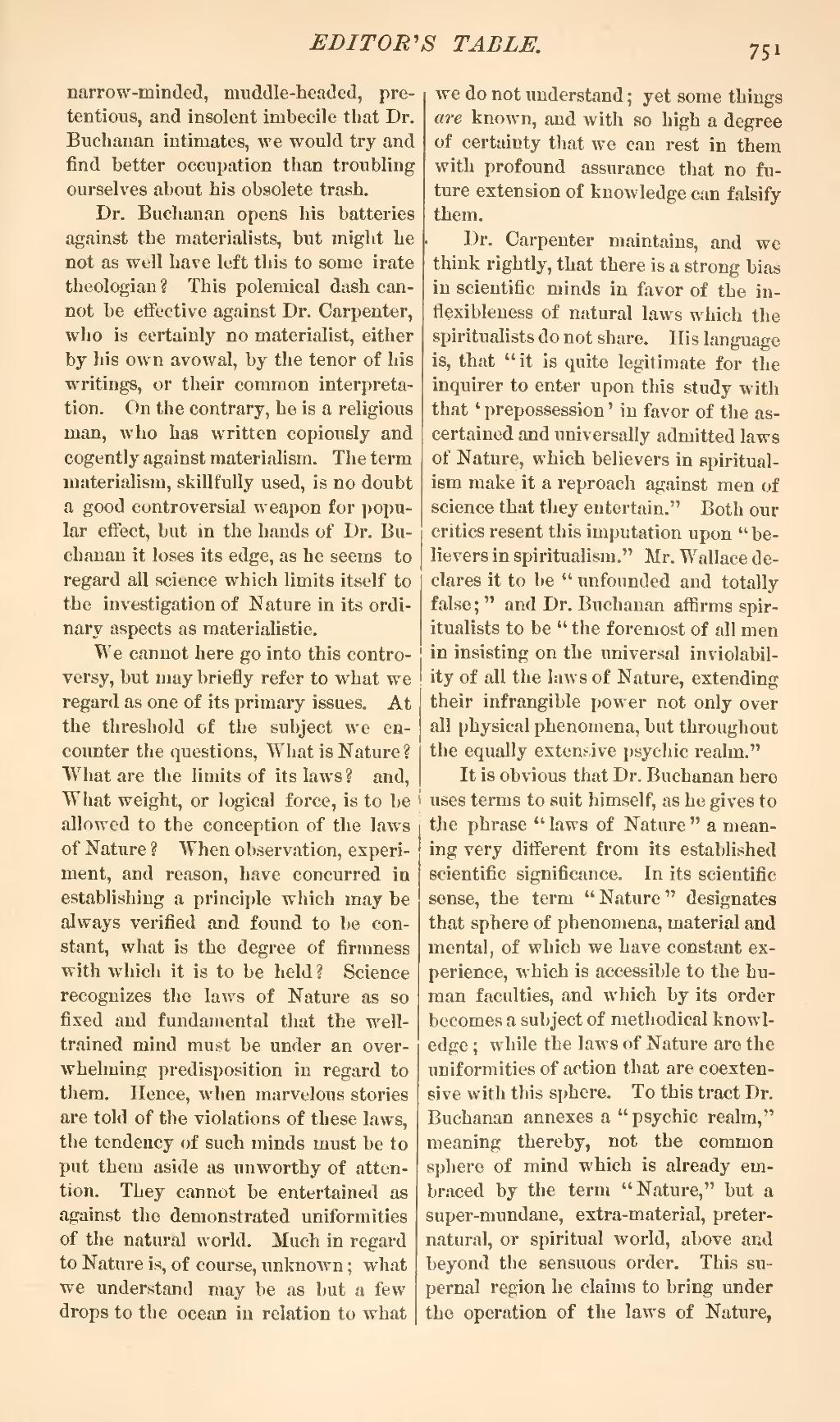narrow-minded, muddle-headed, pretentious, and insolent imbecile that Dr. Buchanan intimates, we would try and find better occupation than troubling ourselves about his obsolete trash.
Dr. Buchanan opens his batteries against the materialists, but might he not as well have left this to some irate theologian? This polemical dash cannot be effective against Dr. Carpenter, who is certainly no materialist, either by his own avowal, by the tenor of his writings, or their common interpretation. On the contrary, he is a religious man, who has written copiously and cogently against materialism. The term materialism, skillfully used, is no doubt a good controversial weapon for popular effect, but in the hands of Dr. Buchanan it loses its edge, as he seems to regard all science which limits itself to the investigation of Nature in its ordinary aspects as materialistic.
We cannot here go into this controversy, but may briefly refer to what we regard as one of its primary issues. At the threshold of the subject we encounter the questions. What is Nature? What are the limits of its laws? and, What weight, or logical force, is to be allowed to the conception of the laws of Nature? When observation, experiment, and reason, have concurred in establishing a principle which may be always verified and found to be constant, what is the degree of firmness with which it is to be held? Science recognizes the laws of Nature as so fixed and fundamental that the well trained mind must be under an overwhelming predisposition in regard to them. Hence, when marvelous stories are told of the violations of these laws, the tendency of such minds must be to put them aside as unworthy of attention. They cannot be entertained as against the demonstrated uniformities of the natural world. Much in regard to Nature is, of course, unknown; what we understand may be as but a few drops to the ocean in relation to what we do not understand; yet some things are known, and with so high a degree of certainty that we can rest in them with profound assurance that no future extension of knowledge can falsify them.
Dr. Carpenter maintains, and we think rightly, that there is a strong bias in scientific minds in favor of the inflexibleness of natural laws which the spiritualists do not share. His language is, that "it is quite legitimate for the inquirer to enter upon this study with that 'prepossession' in favor of the ascertained and universally admitted laws of Nature, which believers in spiritualism make it a reproach against men of science that they entertain." Both our critics resent this imputation upon "believers in spiritualism." Mr. Wallace declares it to be "unfounded and totally false;" and Dr. Buchanan affirms spiritualists to be "the foremost of all men in insisting on the universal inviolability of all the laws of Nature, extending their infrangible power not only over all physical phenomena, but throughout the equally extensive psychic realm."
It is obvious that Dr. Buchanan here uses terms to suit himself, as he gives to the phrase "laws of Nature" a meaning very different from its established scientific significance. In its scientific sense, the term "Nature" designates that sphere of phenomena, material and mental, of which we have constant experience, which is accessible to the human faculties, and which by its order becomes a subject of methodical knowledge; while the laws of Nature are the uniformities of action that are coextensive with this sphere. To this tract Dr. Buchanan annexes a "psychic realm," meaning thereby, not the common sphere of mind which is already embraced by the term "Nature," but a super-mundane, extra-material, preternatural, or spiritual world, above and beyond the sensuous order. This supernal region he claims to bring under the operation of the laws of Nature,
